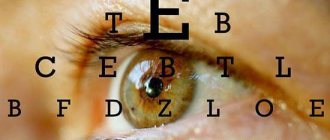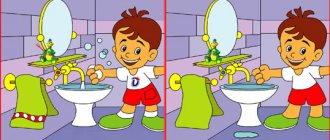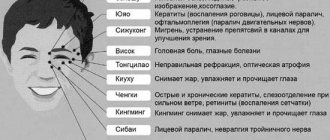Focus in psychology
Our brain, like a computer, constantly analyzes a huge amount of information.
For the most complete picture of everything that is happening around him, he needs to take into account as many details and nuances as possible. In addition to actual objects and phenomena, previously accumulated experience and information are also taken into account. The person himself is not aware of most of this work; it occurs in the subconscious. But we comprehend a significant part. Concentration is the ability to comprehend one thing at a specific moment in time, without allowing information noise to distract consciousness from the main thing. Different people have this ability to varying degrees. Extraneous stimuli, multitasking, and a large number of unsolved problems distract our consciousness from the current action. Read on to learn how to increase your concentration.
Concentration: what it is and how it works
Let's start with the most basic: what is concentration? According to psychologists, it is the act of directing interest or action towards one goal. Yes, it sounds boring, but there is a very important idea hidden here.
What is concentration
To concentrate on one thing, you have to ignore everything else.
Concentration appears only when we say “yes” to one option and “no” to all the others. In other words, exclusion is a necessary condition for concentration.
What you don't do determines what you can do.
Tim Ferriss
writer, speaker
Of course, staying focused doesn't require saying no all the time; it's about saying no now, in the moment. Later you can do something else, but for now you should focus your attention on only one thing.
Focus is the key to productivity. By saying no to any other options, you open up your ability to complete the one remaining task.
Now the important question: what can you do to focus on the things that matter and ignore the unhelpful ones?
Why can't I concentrate?
Most people don't have problems concentrating. They have difficulty making decisions.
We can convince ourselves to focus on the task at hand by removing all distractions from the path. Have you ever had a task that you had to finish no matter what? You did it because the deadline made the decision for you. You may procrastinate, but as soon as the matter forces you to make a decision, you act.
Often, instead of making the difficult decision to choose one thing to do, we convince ourselves that it is better to multitask. But this is an ineffective approach, and here's why.
Why multitasking doesn't work
Technically, we can do two things at the same time. For example, watch TV and cook dinner or answer incoming calls during a phone call.
But it is impossible to concentrate on two things at the same time. You're either watching TV while stirring pasta in the pan in the background, or you're cooking pasta and the TV becomes background noise. At any given moment you are concentrating on either one or the other.
Multitasking forces your brain to quickly switch attention from one thing to another. And if the human brain could move from one job to another without additional effort, there would be no problem. But our heads don't work that way.
Remember a time when someone interrupted you while you were writing a letter. When the conversation ends, it usually takes you a few minutes to get your bearings, remember what you wrote about, and continue. Something similar happens when you do several things at once.
Every time you switch from one task to another and back again, you have to exert mental effort.
In psychology, this is called the switching cost effect.
Switching costs are the interruptions in productivity we experience when we shift our attention from one task to another. Research Reducing the effect of email interference on employees. A 2003 study published in the International Journal of Information Management found that when distracted by routinely checking email every five minutes, a person spends an average of 64 seconds resuming the task at hand.
In other words, we waste one minute out of every six on email alone.
The myth about multitasking is that it makes you more efficient. What really matters is concentration.
The secret of success
All the yogi’s attention and energy should be directed towards completing one task at hand. The slightest leak of attention to the side will instantly reduce work efficiency
This applies not only to yoga practices, but also to the everyday affairs of every person. Therefore, training attention and concentration is doubly useful.
Self-control is one of the main components of yoga. It is common for the average person’s attention to always be in motion, switch and wander. And during important matters, consciousness imperceptibly, but constantly leads thoughts to the side. This phenomenon is normal, but requires work on yourself.
With the achievement of the skill of concentration, a person reaches a completely new level of life. Willpower achieved through concentration directs physical and mental energy in the right direction. This significantly saves energy, allows you to complete assigned tasks faster, and ultimately frees up a lot of free time.
Is it possible to develop attention?
How to train attention? - an important question, but first you need to understand whether this can be done in principle. To do this, let’s look at what attention is. Attention is the ability of selective perception. Like other human skills, attention can be developed. But before you start training, it’s worth finding out what types and properties of attention there are. After all, working with them has its own specifics.
Attention can be involuntary (passive), voluntary (active) and post-voluntary . The first is a person’s reaction to an unexpected stimulus. For example, withdrawing your hand from a hot pan or jumping to the side if a car horn sounds from behind, etc. Its importance is difficult to overestimate, since involuntary attention helps preserve life or health. But it’s practically impossible to train him. Unless we are talking about muscle memory, when a person brings certain actions to automaticity. Someone may not even understand where the opponent’s fists are “flying” from, but his trained body will itself avoid danger.
The second is a conscious mental action associated with a volitional effort to concentrate in a certain direction. This is where attention management comes into play, which can be developed and trained.
Third, it arises when interest in the object of perception appears. In this case, just as with passive attention, there is no need to make volitional efforts. This has to do with relevance to the observer.
Take the perception type test
Properties of attention.
Attention is characterized by five main components:
- Directionality – focusing on a specific object;
- Concentration – maintaining attention in the required direction;
- Volume – the ability to observe several objects simultaneously;
- Stability – duration of concentration;
- Switchability – changing objects of observation.
Each of these properties can be improved and trained.
Oxygen, sleep, sugar and drinking regime
Every person should know these 4 factors. The brain needs them for optimal levels of performance.
Oxygen
An open window helps prevent drowsiness while studying. At the same time, it can provide a cooler environment. On the other hand, you may be distracted by some sounds from outside. Therefore, oxygen can be supplied to the body through aerobic exercise during a break. There is no need to train with a heavy load - just do a few squats.
Dream
During sleep, processes of storing information in long-term memory occur. Despite the lack of time, sleep for about 30 minutes to give the brain a chance to change the contents of the memory. Studies have shown that long-term lack of sleep significantly reduces the ability to concentrate. In addition to sleep, relaxation exercise techniques, such as autogenic training and Jacobson's progressive relaxation, help.
Sugar
The brain is a big “consumer” of glucose, so ways to concentrate necessarily include nutrition. This does not mean that you should consume sugar and sweets in large quantities. This diet will quickly increase the amount of sugar in the blood, but in a short time its level will decrease, causing mild hypoglycemia, accompanied by fatigue and hunger. A good choice is a banana or other fruit, oatmeal, rice, but natural honey is best. It is advisable to avoid heavy foods that cause fatigue.
Drinking regime
The liquid accelerates the regeneration of brain cells, ensures the supply of nutrients, and has a positive effect on the chemical processes occurring in the brain during learning. It has been shown that children in elementary and high school who follow a drinking regime have better results in school than schoolchildren who drink little fluid.
Medicines to improve attention in children and adolescents
Children and adolescents require increased concentration during the learning process, and therefore are more susceptible to mental overload. Nootropic drugs improve blood circulation and metabolism in brain cells, activate thought processes and promote good study.
Modern medicine offers a large number of means to stimulate the nervous system of schoolchildren. Medicines to improve brain activity are available without a prescription, but they must be taken strictly as prescribed by a neurologist or psychiatrist. Their uncontrolled use, especially in children, can be dangerous.
Basic drugs to improve memory and attention:
- Glycine is a nootropic drug that increases performance, normalizes sleep, has a sedative effect, improves mental abilities, and activates protective inhibition processes in the central nervous system. Release form: tablets that dissolve under the tongue until completely dissolved.
- Piracetam - has a positive effect on metabolic processes in the brain, promotes better assimilation of educational material. But if there is a history of individual intolerance or renal failure, the drug is contraindicated. Release form: tablets and capsules.
- Biotredin. The drug contains vitamin B6 and threonine - substances that have a positive effect on the nervous system. The product activates the cognitive functions of the brain, has a calming effect, and helps improve memory and attention in adolescents. Release form: tablets.
- Phenibut is a nootropic drug that stimulates blood flow to the brain, reducing the tone of its blood vessels. When using this medicine as prescribed by a doctor, mental performance significantly improves, memory and the ability to remember large amounts of information are activated. The product is available in tablet form.
- Aminalon is a gamma-aminobutyric acid preparation. Restores metabolism in the brain, improves glucose processing, and removes toxins. Indicated for disorders of the nervous system, to activate mental activity. Release date: tablets.
- Pantogam is a nootropic drug containing gamma-aminobutyric acid as an active ingredient. Indicated for psycho-emotional overload, attention and memory disorders, to activate intellectual activity, and relieve nervous tension. Release form: syrup, tablets and capsules.
- Tenoten is a homeopathic medicine that improves the nutrition of children's brain cells, accelerates the maturation of the child's nervous system, and promotes the activation of brain processes. Available in tablet form.
- Noben is a product based on coenzyme Q10. As a result of intake, the concentration of this substance in brain cells increases, memory and the processes of remembering information are activated. Release form: capsules.
- Bilobil (analogs - Tanakan, Biloba and others) is a medicine based on an extract of the ginkgo biloba plant. Normalizes the tone of small vessels in the brain, stimulates the nervous system, and has a slight calming effect. The product is available in tablet form.
- Intellan - relieves nervous tension, effective for mental overload. Release form: syrup and tablets.
- Phezam is indicated for disorders of mental function, decreased memory and concentration, as well as retardation in intellectual development. The product eliminates irritability and promotes better learning. Release form: capsules.
Editor's note: Possible causes and treatments for persistent headaches
It must be remembered that drug treatment for brain disorders alone will not be enough. You can develop intellectual functions by any available means - memorization, reading, various educational games. In addition, the child needs the care and support of his parents. Only if all these conditions are met can excellent results be achieved in a fairly short period of time.
Recommendations
You can improve your ability to concentrate in other ways. The main thing is to exercise regularly, every day if possible.
Don't be too busy trying to do several things at once
You can often see how a person, working on a computer, tries to carry on a conversation on the phone and talk with a colleague. The result is that none of the tasks are completed to the end.
The brain does not have time to concentrate attention on one thing or process the information received. Plus, the habit of constantly jumping from one to another develops.
As a result, the ability to focus attention decreases.
To improve the situation, you need to complete even small things, be it reading a book or watching a movie.
Increase your resistance to distractions
Anything can distract your attention, for example, extraneous sounds, music or someone talking on the phone. As a result, a person forgets about his affairs for a few moments.
In this situation, you need to return to work as quickly as possible, trying to let everything unnecessary pass your consciousness.
You need to avoid being distracted by unimportant matters not only at work, but also outside of it.
From the editor: Disease vegetative-vascular dystonia
Focusing on problems will prevent you from concentrating on the main task and, as a result, completing it
How to concentrate attention can be seen in a clear example. Let's say the difficulty is a high mountain or a big black spot
In both cases, they need to be reduced and discarded. After this, they will not flash before your eyes, drawing attention to themselves.
Take breaks from time to time
It is difficult to concentrate on one thing for a long period of time. Therefore, you need to take short breaks regularly
In order to restore performance and increase productivity, a 15-minute rest every 2-3 hours is enough. During this period, you need to go outside, have a snack, and talk with colleagues. This will help the brain “reboot” and return to work with renewed vigor.
Try to make your workspace comfortable and practical
It has long been known that the state of the desktop directly affects productivity, performance and concentration. Comfort is determined by several parameters:
- chair height;
- good lighting;
- correct distance to the monitor.
Order is no less important. On the table you need to store only those papers and devices that are needed to solve current problems.
Work according to plan
Before starting work, you need to write in detail what and how to do
An action plan will help you focus on really important tasks, save time and effort, and will also prevent you from being distracted by extraneous matters, for example, reading news on social networks or meaningless correspondence.
Making an action plan and planning also protects against overwork and stressful situations.
Set goals for yourself
This is another way to improve your concentration. Precise goals with deadlines for their implementation help you not to be distracted by trifles
And it doesn't matter whether they are long-term or not
Train your memory
A good memory allows you not only to quickly evaluate and process information
Thanks to it, you can easily concentrate on the most important matters and tasks. That is why its development must be approached with the utmost seriousness
There are a lot of exercises to develop memory. One of them is to think about all the events that happened during the day. This should be done regularly for 10-15 minutes before bedtime. Results will be noticeable after just a few sessions.
This will improve not only memory, but also observation, as well as the ability to maintain attention for a long period of time.
Training memory and attention in adults - the best exercises
Classes to improve memory in adults are not such a difficult task. If you wish, you don’t have to waste extra time on training attention in adults. Listen carefully to your friend, trying to remember the color of his shirt, shoes, coat, eyes, hair. After you part, try to remember these colors.
While walking down the street, try to remember the numbers of buses or cars passing by. If you are stuck in a traffic jam or have a long ride on a trolleybus, solve crosswords and scanwords
They are great for training memory and attention.
Memorize three words of a foreign language every day. Learn poetry, read at least 20 pages a day. These simple ways train the brain and memory of busy adults.
Try not to overwork and eat right. Fresh fruits and vegetables, greens, a lean diet, enough calories, a varied menu are necessary to nourish brain cells.
Properly organized daily routine
The key to a child’s successful education is a properly organized daily routine. It will be easier for a child to “join” the school process if he has a clear work and rest schedule. One of the most important aspects is sleep. A primary school student should sleep about ten hours at night. There can be no talk of concentration or productivity if the child comes to class sleepy.
Extracurricular activities are good, but in moderation. When parents immediately after school take their child from one elective to another, there will be no benefit. The child is not able to cope with such a volume of information and will simply get tired. The baby should have free time when he can relax.
Editorial: What is lacunar ischemic stroke
Also, for the healthy development of a child, you need to arrange walks in the fresh air every day, lasting two to three hours. By the way, walks can also include active games, for example, with a ball
In general, sports activities are very effective in increasing attention and concentration. Therefore, the baby can be sent to dancing or to a sports section
It is very important to organize your child’s workspace at home. This can be a separate room or your own corner in the apartment
Here the student will complete his assignments and also store all his textbooks and notebooks. It is also important to teach your child to keep the workplace in order. It is advisable for the child to do homework at the same time every day. In the future, this principle will help the child to quickly engage in the process of studying school subjects.
While doing homework, the child should not be distracted by anything. It is better to turn off the TV; family members should not talk loudly. The absence of external stimuli will help the baby concentrate better and quickly complete homework.
Factors influencing memory development
Memorization efficiency is affected by age and health status. Over time, memory deteriorates. After 30 years, you need to make more efforts to maintain memory functions and intelligence in old age.
Elderly woman reading
Important! Stress, overwork, and anxiety negatively affect the emotional state and affect the ability to quickly remember information. Some medications, alcohol, and caffeine in uncontrolled quantities impair memory
Information is better absorbed if:
- It arouses interest, the process of learning is easy, with pleasure;
- Associated with bright positive emotions and impressions;
- Used in practice;
- Understandable, presented in easily accessible language;
- Often meets.
The information provided must be logically structured; this is what will allow it to be analyzed and captured for a long time. A person can resort to rote memorization when data remains in memory in the form in which it was presented and is memorized. Such information will not remain at a person’s disposal for long. You need to think about what you hear, be able to highlight the main idea, trace the connection and logic. Then the main points that convey the essence of the story will be stored in memory.
Useful exercises for training
Experts say that attention can be considered developed if a person adheres to the following rules in his activities:
Can create the necessary motivation by recognizing the importance of work. Exercise control over the arbitrariness of mental processes. Removing distractions that interfere with attentiveness It is well known that the beginning is half the battle, so you need to be able to eliminate distractions. Learn effective techniques for developing attention, since the psyche is structured in such a way that continuous development is necessary to maintain it in good shape. The main rule is that you can’t be half attentive; then an activity will bring success when all your attention is focused on it. attention and thinking. For your information
To follow these rules, attention training is necessary, it is better if it is a complex technique, where useful exercises involve the combined development of memory, attention and thinking
For your information. To follow these rules, attention training is necessary, it is better if it is a complex technique, where useful exercises involve the combined development of memory, attention and thinking.
Regular healthy training helps improve attention
For adults
Psychologists suggest that adults first master basic exercises and then complicate and diversify them.
Anyone can choose the most suitable attention exercises for themselves. The main thing is that they are accessible and do not require unnecessary preparation:
Editorial: Ways to develop analytical skills
- “Labyrinths” - a simple way of training can be easily found in magazines or on websites. You can practice visually finding a way out of tangled lines everywhere: in transport, during a break at work.
- A similar exercise, “Corrective Test,” is offered on many online sites. You need to use your eyes to identify words among a chaotic set of letters.
- “Find the mistake” is an interesting task for adults and children. In two identical pictures you need to find differences that are invisible at first glance. You can only detect them if you look closely at the images.
For children and teenagers
For your information. Children of preschool and primary school age may find monotonous training boring. Therefore, it is better to make all tasks interesting and exciting.
Exercises with mathematical content are useful
You can consolidate your knowledge in mathematics and develop your attention. The kids will love the math lotto, which requires large cards with examples and small cards with answers.
The presenter shows the answer card, the players must close the corresponding example on the large card. Classic simulators are graphic dictations that are suitable for preschool and school-age children. Their essence is to draw various patterns or pictures in a squared notebook under dictation. The older the preschooler, the more difficult the tasks. Children love funny games and exercises to develop attention. Therefore, they are more willing to respond to tasks with humor: “Nonsense”, “What did the artist mix up”, “Which word is superfluous”, “Say the opposite”. You can offer logical exercises for attention for teenagers: puzzles, logical problems. A tangram-type simulator is considered popular. A large square is cut into different elements. Then a picture is assembled from the parts.
Tangram for children is a great attention training
- The “Digital Poems” exercise will appeal to both preschoolers and primary schoolchildren. The idea is to pronounce numbers in a certain rhythm, starting slowly and then speeding up, for example, a counting rhyme:
- 2, 12, 46;
- 48, 3, 06;
- 33, 1, 102;
- 8, 10, 32!
You can encrypt any numbers using this method.
This exercise helps develop not only attention, but also logic and memory.
Exercises
The brain can be called a muscle, and every muscle can be trained and developed. By doing exercises to improve your concentration, you will develop the appropriate “muscles” that will help you focus on the tasks at hand with ease. We provide tips on how to improve mindfulness. They are useful for both adults and children.
Meditation
Meditation improves your ability to concentrate. If you meditate every day for 10-15 minutes, then after a couple of weeks you will notice how it has become much easier to concentrate at the right moment.
Reading
An effective way to learn to concentrate, as well as express your thoughts simply and clearly, is by reading a short story and then retelling it. Read a short article in the newspaper and try to summarize its essence.
In the future, complicate the task: read the book for 15-20 minutes, then write down on paper what you remember from it. At first, many small details will fall out of your memory, but in the future you will be able to easily retell in detail everything you read. A sign that you have excellent concentration is detailed retelling.
From the editor: Types of alcoholic epilepsy and how to get rid of it
There is another variation of the exercise: read a short sentence and rewrite it word for word from memory. Over time, add another sentence, then a third. This also trains memorization.
Control over your desires and emotions
Our emotions and desires, especially momentary ones, are almost uncontrollable. But if you learn to control them, your ability to concentrate will increase significantly.
When you constantly feel nervous when hearing unpleasant news or during serious conversations, control yourself and prevent yourself from feeling anxious and surprised. Such self-control will help you in all areas of life - not just at work. If, for example, you follow a healthy diet and suddenly want to treat yourself to junk food, don’t let this desire get the better of you - take control of it.
Focusing on sleep
Recommendation for those who often have sleep problems. This method will help not only increase concentration, but also relieve insomnia. Sit in a chair, place a glass of water in front of you. Think about how calm he is and imagine his calmness being transmitted to you. Soon you will notice how relaxed you are and you will feel like falling asleep.
You can also imagine yourself as an inanimate object - for example, a tree branch that lies quietly in a calm forest.
Focusing on processes inside the body
Lie down and relax. Concentrate on the beating of your heart, imagining how with its help blood is distributed to all organs - to the tips of your fingers.
Focusing on smells
While walking, concentrate on smells - for example, the aroma of flowers, passing by a flower bed
After this, choose a specific smell and try to concentrate exclusively on it, discarding extraneous thoughts and feelings










